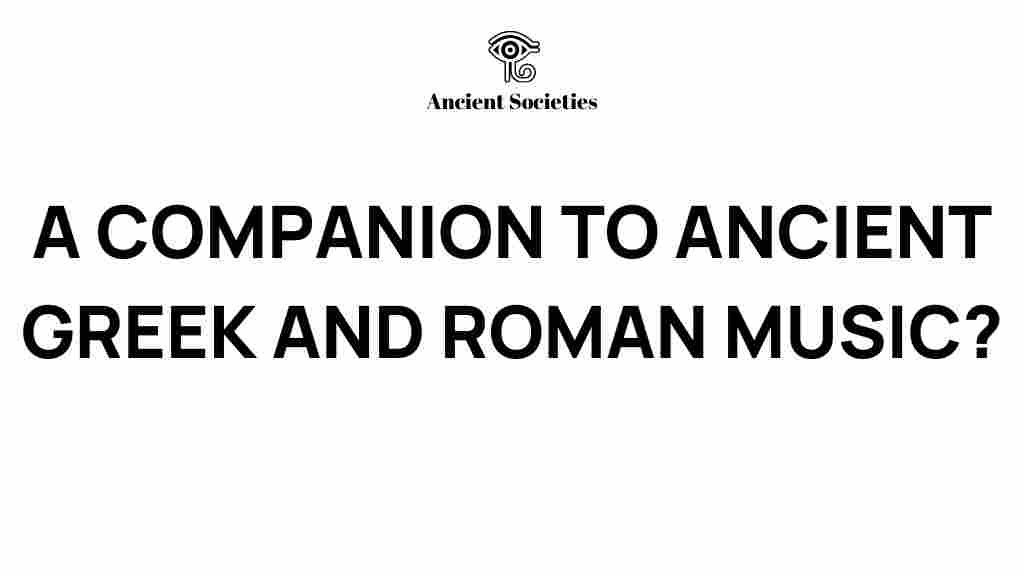Unveiling the Mysteries of Ancient Music: A Journey Through Greek Culture and Roman History
Music has always played a pivotal role in human civilization, providing a window into the cultural and social dynamics of societies. This is especially true for ancient music, which offers a rich tapestry woven from the threads of Greek culture and Roman history. As we delve into the musical traditions of these ancient civilizations, we will uncover the instruments they used, the contexts in which music was performed, and how these practices shaped their distinct historical soundscapes.
The Significance of Ancient Music in Greek Culture
Greek culture was deeply intertwined with music, which was considered an essential part of education, religion, and public life. From the epic poems of Homer to the philosophical discourses of Plato, music was revered as a powerful art form that could evoke emotions and provoke thoughts.
- Education and Music: Music was central to the education of young Greeks, with the belief that it cultivated virtue and harmony.
- Religious Ceremonies: Music played a vital role in rituals and ceremonies, enhancing the spiritual experience of worshippers.
- Public Performances: Festivals, such as the Dionysia, showcased musical performances that were integral to communal identity.
Exploring Roman History: The Adaptation of Musical Traditions
As the Roman Empire expanded, it absorbed various aspects of Greek culture, including music. Romans adapted Greek musical practices to fit their own societal needs, resulting in a unique blend of traditions.
- Military Music: Romans used music for military purposes, employing instruments like the tuba and cornu to relay commands.
- Entertainment: The Romans enjoyed performances in amphitheaters, where music accompanied dramatic presentations, enhancing the theatrical experience.
- Social Functions: Music was prevalent in banquets and public gatherings, serving as a backdrop for social interactions.
Musical Instruments of the Ancient World
To fully understand ancient music, one must explore the various musical instruments that played a crucial role in these societies. Both the Greeks and Romans utilized a variety of instruments, each contributing to their distinctive soundscapes.
Greek Instruments
- Lyre: A stringed instrument often associated with Apollo, the god of music, used in poetry and festivities.
- Aulos: A double-reeded wind instrument that produced a rich, vibrant sound, commonly used in processions and theatrical performances.
- Kithara: A more advanced version of the lyre, used by professional musicians and in solemn religious ceremonies.
Roman Instruments
- Tuba: A straight trumpet used in military contexts to signal troops.
- Corinthian Flute: A woodwind instrument that gained popularity in both military and social settings.
- Hydraulis: An early form of the organ that used water to create sound, showcasing Roman ingenuity in music technology.
Reconstructing the Historical Soundscape
The historical soundscape of ancient civilizations provides insights into their daily lives and cultural practices. Through the study of archaeology and ancient texts, researchers can piece together how music was experienced in various contexts.
- Archaeological Evidence: Excavated instruments and depictions in art help us understand the types of music that were prevalent.
- Musical Notation: Ancient manuscripts containing musical notation provide a glimpse into how music was structured and performed.
- Literary References: Texts from philosophers and poets often reference music, providing context and meaning to its role in society.
Classical Traditions and Their Legacy
The influence of ancient music extends far beyond its time, laying the foundation for classical traditions that echo through history. The exploration of ancient music has not only enriched our understanding of cultural heritage but also continues to inspire contemporary musicians and composers.
- Influence on Western Music: Many aspects of Western music theory and practice can be traced back to ancient Greek and Roman traditions.
- Preservation of Instruments: Many ancient instruments have been revived or adapted in modern music, keeping the ancient sound alive.
- Educational Relevance: The study of ancient music is incorporated into music education, linking current practices with historical roots.
Step-by-Step Process for Exploring Ancient Music
If you are interested in exploring the world of ancient music, here is a step-by-step guide to get you started:
- Research Historical Context: Begin by studying the social and cultural backdrop of ancient Greece and Rome.
- Identify Key Instruments: Familiarize yourself with the instruments used in these cultures and their significance.
- Listen to Reconstructions: Seek out recordings that attempt to recreate ancient music using historical instruments.
- Attend Performances: Look for concerts or performances that focus on ancient music, providing a live experience of the soundscape.
- Engage with Communities: Join forums or groups interested in ancient music for discussions and shared resources.
Troubleshooting Tips for Exploring Ancient Music
As you embark on your journey into the realm of ancient music, you may encounter some challenges. Here are some tips to help you navigate:
- Accessing Resources: If you struggle to find materials, check local libraries or university archives for specialized collections.
- Understanding Terminology: Familiarize yourself with musical terminology from both Greek and Roman contexts to enhance your comprehension.
- Connecting with Experts: Don’t hesitate to reach out to musicologists or archaeologists who specialize in ancient music for guidance.
Conclusion: The Enduring Legacy of Ancient Music
The exploration of ancient music serves as a testament to the creativity and innovation of Greek culture and Roman history. Through the study of musical instruments, historical soundscapes, and archaeological findings, we gain insights into the lives and values of these ancient civilizations. Their musical traditions continue to resonate today, influencing modern music and enriching our cultural heritage.
To delve deeper into the fascinating world of ancient music, consider visiting this resource that offers further readings and insights. Additionally, for a more engaged experience, you can check out this interactive platform that connects enthusiasts and experts in the field.
This article is in the category Culture and created by AncientSocieties Team
